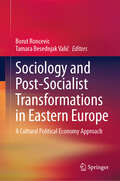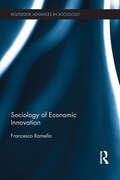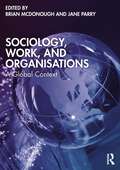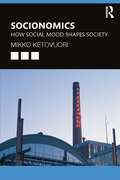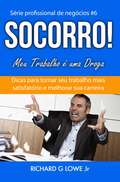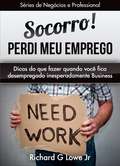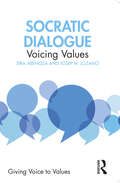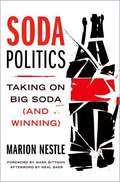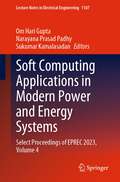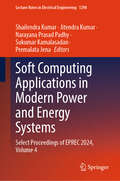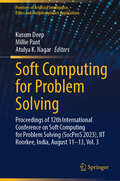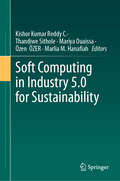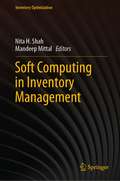- Table View
- List View
Sociology and Post-Socialist Transformations in Eastern Europe: A Cultural Political Economy Approach
by Borut Roncevic Tamara Besednjak ValičThe volume offers a unique and comprehensive reflection on the role of sociology and sociologists in the transformation of post-socialist Eastern European societies. It provides detailed insight on the status of sociology in Eastern Europe, its institutional development, specifics of national sociological traditions, the controversial and ambiguous relationship with the political system and, importantly, state-of-the-art knowledge about the role of sociology as a discipline and sociologists as academics, educators, public intellectuals, experts, politicians, or civil society activists in three decades of transformation. The volume follows a cultural political economy approach and provides a series of national case studies that analyse the role of sociology in re-imagining Eastern European societies. This topical volume is of interest to a wide, interdisciplinary readership in the social sciences, especially students and researchers working on Eastern Europe and on post-socialist societies.
Sociology in Germany: A History (Sociology Transformed)
by Stephan MoebiusThis open access book traces the development of sociology in Germany from the late 19th century to the present day, providing a concise overview of the main actors, institutional processes, theories, methods, topics and controversies. Throughout the book, the author relates the discipline’s history to its historical, economic, political and cultural contexts. The book begins with sociology in the German Reich, the Weimar Republic, National Socialism and exile, before exploring sociology after 1945 as a ‘key discipline’ of the young Federal Republic of Germany, and reconstructing the periods from 1945 to 1968 and from 1968 to 1990. The final chapters are devoted to sociology in the German Democratic Republic and the period from 1990 to the present day. This work will appeal to students and scholars of sociology, and to a general readership interested in the history of Germany.
Sociology of Economic Innovation (Routledge Advances in Sociology)
by Francesco RamellaThis book offers a sociological overview of the theories and research on economic innovation. Over the past few decades, the economics of innovation has given rise to a lively flow of studies, and innovation studies continues to develop as an interdisciplinary field of research. Sociology in general, and economic sociology in particular, have already made a significant contribution to innovation and continue to play a crucial role in this emerging field. This book presents an integrated sociological approach to the study of economic innovation. It explores the key theories and sociological research on innovation, as well as other contributions to the field of Innovation Studies from economists, geographers, and psychologists. Ramella argues that in order to understand the processes of innovation, it is necessary to look at the actors of innovation, at the relations that exist between them and at the sectoral and territorial contexts in which they operate. For students, this book includes international case studies throughout, as well as further study questions at the end of each chapter.
Sociology of Interdisciplinarity: The Dynamics of Energy Research
by Chris Foulds Antti SilvastThis Open Access book builds upon Science and Technology Studies (STS) and provides a detailed examination of how large-scale energy research projects have been conceived, and with what consequences for those involved in interdisciplinary research, which has been advocated as the zenith of research practice for many years, quite often in direct response to questions that cannot be answered (or even preliminarily investigated) by disciplines working separately. It produces fresh insights into the lived experiences and actual contents of interdisciplinarity, rather than simply commentating on how it is being explicitly advocated. We present empirical studies on large-scale energy research projects from the United Kingdom, Norway, and Finland. The book presents a new framework, the Sociology of Interdisciplinarity, which unpacks interdisciplinary research in practice. This book will be of interest to all those interested in well-functioning interdisciplinary research systems and the dynamics of doing interdisciplinarity, including real ground-level experiences and institutional interdependencies.
Sociology of Work: An Encyclopedia
by Vicki SmithThe simple act of going to work every day is an integral part of all societies across the globe. It is an ingrained social contract: we all work to survive. But it goes beyond physical survival. Psychologists have equated losing a job with the trauma of divorce or a family death, and enormous issues arise, from financial panic to sinking self-esteem. Through work, we build our self-identity, our lifestyle, and our aspirations. How did it come about that work dominates so many parts of our lives and our psyche? This multi-disciplinary encyclopedia covers curricular subjects that seek to address that question, ranging from business and management to anthropology, sociology, social history, psychology, politics, economics, and health. Features & Benefits: International and comparative coverage. 335 signed entries, A-to-Z, fill 2 volumes in print and electronic formats. Cross-References and Suggestions for Further Readings guide readers to additional resources. A Chronology provides students with historical perspective of the sociology of work. In the electronic version, the comprehensive Index combines with the Cross-References and thematic Reader's Guide themes to provide robust search-and-browse capabilities.
Sociology, Work and Organisation: Seventh Edition
by Tony WatsonThe seventh edition of Sociology, Work and Organisation is outstandingly effective in explaining how we can use the sociological imagination to understand the nature of institutions of work, organisations, occupations, management and employment and how they are changing in the twenty-first century. Intellectual and accessible, it is unrivalled in the breadth of its coverage and its authoritative overview of both traditional and emergent themes in the sociological study of work and organisation. The direction and implications of trends in technological change are fully considered and the book recognises the extent to which these trends are intimately related to changing patterns of inequality in modern societies and to the changing experiences of individuals and families. Key features of the text are: clear structure; ‘key issue’ guides and summaries with each chapter; identification of key concepts throughout the book; unrivalled glossary and concept guide; rich illustrative snapshots or ‘mini cases’ throughout the book. This text engages with cutting-edge debates and makes conceptual innovations without any sacrifice to clarity or accessibility of style. It will appeal to a wide audience, including undergraduates, postgraduates and academics working or studying in the area of work and the organisation of work, as well as practitioners working in the area of human resources and management generally.
Sociology, Work, and Organisations: A Global Context
by Brian McDonough Jane ParryThis accessible edited collection provides global context for undergraduate and postgraduate students studying the sociology of work and organisations. Composed of short, example-led chapters, this book covers a wide range of contemporary topics, including the COVID-19 pandemic, the digitalisation of work, the gig economy, and the shifting roles of women and other marginalised groups.The book’s innovative approach uses case studies as diverse as work–life balance in China, gender pay inequity in Britain and Germany, and the exploitation of workers on the Mexico–US border, to incorporate perspectives from both the Global North and South and provide students with the tools to analyse new developments in the rapidly changing world of work. The book is particularly concerned with inequalities and marginalisation in the workplace, discussing discrimination against women, ethnic minorities, migrants, and older workers. The book also explores how increasing digitalisation, the rise of the gig economy and the COVID-19 pandemic have impacted working practices and how this relates to precarious employment. Other chapters are dedicated to issues of workplace organisation, including female leadership, work–life balance, and well-being. The book goes on to explore how climate change and policies such as Universal Basic Income may shape the future of work in the near future.Each chapter also includes useful pedagogical resources including practice exam questions, key concepts and definitions, and further readings. Therefore, the book will be therefore essential reading for undergraduate and postgraduate students studying the sociology of work, business management, and organisation.
Sociomaterial Practices in Medical Work: An Ethnography in the Operating Room
by Attila BruniThis book presents a sociomaterial perspective on work and organizational practices within the operating room. Looking at medical work from a sociological perspective and drawing on ethnographic observations conducted in a hospital's operating block, this book analyses the entanglements of humans and technologies in the execution of everyday activities. It highlights how the sociomateriality of work and organizational practices manifests in the encounters between operators and material artifacts and in the way objects and technologies participate in processes and practices of organizational communication. Objects and technologies are also shaped by these very practices, giving rise to a recursive relationship wherein technology, communication, and organizing are intertwined.A sociomaterial understanding of organizational and working practices explains the role of objects and technologies in the generation and enactment of professional knowledge, while questioning how power materializes through the interaction of humans and technical objects. This book will be of great interest to scholars, students, and practitioners interested in how sociomaterial perspectives can inform organization studies and reshape our understanding of the intricate relationships between humans and technologies in healthcare settings.
Socionomics: How Social Mood Shapes Society
by Mikko KetovuoriSocionomics: How Social Mood Shapes Society explores the main principles and applications of socionomic theory as elaborated by Robert Prechter. Socionomic theory posits that an omnipresent social mood, shifting constantly in a wave form through all aspects of society, is responsible for the aggregate tenor and character of all social, economic and cultural trends, from fluctuations in the stock market to the popularity of particular genres of music at a given time.The social mood as an endogenous and collective force has its roots in the herding instinct often identified amongst crowds. Individuals typically make rational decisions when acting alone, and in the context of certainty, but in groups and in context of uncertainty, mood-based mimetic behavior can affect all the participants. As social mood often goes unnoticed, people tend to give their collective feelings labels to rationalize them, thus constituting ‘public opinion’. Therefore, whilst ‘public opinion’ as presented in the media is usually seen as rational, it is in fact based on the social mood context that often determines how people think, feel and behave. As the internet and social media have become ubiquitous in our daily lives, these rationalizations are spreading faster and faster than ever before and creating a pseudo-reality which can corrupt the collective perception of what is real and what is not.This stimulating and thought-provoking book will be of great interest to academics, practitioners and policymakers with an interest in the humanities and social sciences, particularly sociology and economics.
Sociophysics
by Serge GalamDo humans behave much like atoms? Sociophysics, which uses tools and concepts from the physics of disordered matter to describe some aspects of social and political behavior, answers in the affirmative. But advocating the use of models from the physical sciences to understand human behavior could be perceived as tantamount to dismissing the existence of human free will and also enabling those seeking manipulative skills . This thought-provoking book argues it is just the contrary. Indeed, future developments and evaluation will either show sociophysics to be inadequate, thus supporting the hypothesis that people can primarily be considered to be free agents, or valid, thus opening the path to a radically different vision of society and personal responsibility. This book attempts to explain why and how humans behave much like atoms, at least in some aspects of their collective lives, and then proposes how this knowledge can serve as a unique key to a dramatic leap forwards in achieving more social freedom in the real world. At heart, sociophysics and this book are about better comprehending the richness and potential of our social interaction, and so distancing ourselves from inanimate atoms.
Sociophysics Approach to Epidemics (Evolutionary Economics and Social Complexity Science #23)
by Jun TanimotoThis book presents the fundamentals of evolutionary game theory and applies them to the analysis of epidemics, which is of paramount importance in the aftermath of the worldwide COVID-19 pandemic. The primary objective of this monograph is to deliver a powerful tool to model and analyze the spread of an infectious disease during a pandemic as well as the human decision dynamics. The book employs a variant of the “vaccination game,” in which a mathematical epidemiological model dovetails with evolutionary game theory. From a social physics standpoint, this book introduces an extended concept of the vaccination game starting from the fundamental issues and touching on the newest practical applications.The book first outlines the fundamental basis of evolutionary game theory, in which a two-player and two-strategy game, the so-called 2 × 2 game, and a multi-player game are concisely introduced, and the important issue of how social dilemmas are quantified is highlighted. Subsequently, the book discusses various recent applications of the extended concept of the vaccination game so as to quantitatively evaluate provisions other than vaccination, including practical intermediate protective measures such as mask-wearing, efficiency of quarantine compared with that of isolation policies for suppressing epidemics, efficiency of preemptive versus late vaccination, and optimal subsidy policies for vaccination.
Socorro! Meu Trabalho é uma Droga: Dicas de como Fazer seu Trabalho ser mais Satisfatório e Melhorar sua Carreira
by Richard G Lowe JrVocê não tem que ser vítima de um trabalho que é uma droga. Você pode assumir o controle e mudar a situação. Lidar com um trabalho que está te deixando doente, te fazendo perder dinheiro e promoções ou fazendo com que você fique chateado e irritado sem vender sua alma para a corporação. Seu trabalho está deixando você fisicamente doente? Você tem medo de levantar todos os dias porque você tem que ir ao odiado escritório? Você só se sente vivo nos finais de semana porque não precisa ir trabalhar? Seu chefe é um idiota que está constantemente te assediando, negando aumentos e te deixando infeliz? Não seria melhor estar ansioso para ir trabalhar todos os dias? Você gostaria de um trabalho desafiador, onde você recebe um salário justo, é tratado com humanidade e compaixão e onde recebe os recursos, treinamento e ajuda que precisa para ter sucesso? Eu trabalhei em empregos insatisfatórios para empregadores que não se importavam e não recompensavam um serviço bom e competente. Eu permaneci fiel, fazendo cegamente o que me foi dito, obrigado a ficar de plantão 24 horas por dia, 7 dias por semana, trabalhar sem treinamento e recursos adequados, e passar meses sem um elogio ou um agradecimento. Eu sobrevivi através de pura força de vontade, determinação e uma crença em mim e minhas habilidades. Mas existe uma maneira melhor do que aguentar o abuso e ser vítima de má gestão, apoio insuficiente, exigências não razoáveis e até ilegais. Você pode assumir o controle de sua situação, contanto que esteja disposto a se impor, exigir seus direitos e ser tratado de forma justa, e estar disposto a se mudar se não puder corrigir a situação. * Aprenda a se comunicar sem medo * Lide com o chefe maluco * Lide com assédio sem piedade * Pare de permitir que se aproveitem de você e te usem * Consiga aquela promoção ou aumento que você merece<br
Socorro! O Meu Chefe é Maluco!
by Richard G Lowe Jr Andreia AfonsoSobrevivendo ao chefe Whacko Melhore sua vida profissional. Aumente sua renda. Seja mais produtivo e satisfeito no trabalho. Sinta-se mais feliz e mais em controle O chefe está te deixando louco? Você está sofrendo de assédio? É o seu local de trabalho desagradável e tornando-o fisicamente ou mentalmente doente? Alguma vez você já sentiu como você quer Whack seu chefe por causa de assédio? Eu estive onde você está hoje. Os Whackos Na minha vida, eu tive todos os tipos de gerentes, de um chefe que foi declarado insano para o micromanager compulsivo e, pior de tudo, o gerente para a aposentadoria que não queria aprovar ou fazer qualquer coisa que possa balançar o barco . Eu me sentia atacada, desprezada, desvalorizada e oprimida, às vezes tudo ao mesmo tempo. Essas situações afetaram minha saúde e bem-estar e causaram um sentimento de desamparo e depressão que nada parecia consertar. A vida parecia ser nada, mas fracasso devido às constantes invalidações e negatividade. Seu chefe está te deixando louco? Seu chefe está te deixando louco ou assediando você? É ele ou ela fazendo o seu miserável, negando-lhe levanta e promoções, ou micromanaging cada movimento seu? Você está feliz com sua situação de trabalho? Você entende que não vai melhorar a menos que você faça algo sobre isso? Você prefere olhar para a frente para ir trabalhar todos os dias? Você não gostaria de ser respeitado, ganhar mais dinheiro e ir para casa sentindo-se satisfeito em fazer um trabalho bem feito? Faça alguma coisa sobre isso Bem, eu percebi que eu poderia fazer algo sobre o chefe whacko. Havia muitas opções, de uma conversa simples todo o caminho para encontrar um novo emprego. O que eu percebi é que leva dois para ser uma vítima - o vitimizador (o chefe whacko) ea vítima. Eu decidi quebrar aquela dança louca. Entenda que você pode fazer algo para corrigir a situação
Socorro! Perdi meu emprego
by Richard G Lowe Jr Rodrigo dos Santos LaraDicas do que fazer quando você fica desempregado inesperadamente - repentinamente ter que deixar o emprego pode ser um momento difícil e deprimente na sua vida. Aprenda algumas das coisas que você precisa considerar e lidar caso isso aconteça.
Socrates Comes To Wall Street
by Thomas I. WhiteFor courses in Business Ethics A fresh approach to the assumptions that underlie business practices Two recent events — the 2008 economic meltdown and the ongoing concentration of the nation’s wealth in the hands of a very small percentage of the population — have led many people to question a number of basic assumptions about business, corporations, and the workings of contemporary free-market capitalism in a global economy. Written as a dialogue between Socrates and a hypothetical contemporary CEO, Socrates Comes to Wall Street leads students to think critically about perspectives and practices that are taken as “givens” in most American business schools and corporations. Employing this original and provocative approach, author Thomas White seeks to encourage the next generation of business leaders to be more astute about the implications of their actions, and to act more prudently and more fairly than we have seen in the recent past.
Socratic Dialogue: Voicing Values (Giving Voice to Values)
by Josep M. Lozano Sira AbenozaGiving Voice to Values is a very important tool that has helped many professionals better align what they do with what they value and believe. This book introduces the methodology of Socratic Dialogue as a complementary set of tools for creating spaces of joint reflection in which one can gain clarity about one’s values and gain the confidence to voice them effectively. Socrates’ main concern was to progressively reach a higher alignment between ideas and actions: that is, to achieve a harmony between what we think, what we say and what we do. The first step to giving voice to our values involves introspection and dialogue with others – which is how we can become aware of what we really think and value. An examined life, Socrates reminds us, is a fulfilled one. Based on the authors' more than ten years’ experience teaching Socratic Dialogue to business and law students, executives and professionals, faculty, incarcerated people and other vulnerable groups, the book provides teachers and practitioners with a roadmap to conceive, design and conduct Socratic Dialogue courses and sessions. It provides context for the method and its adaptation to the challenges of the 21st century. The book also offers guidance on how to structure a Socratic Dialogue classroom, as well as a series of tried-and-true activities and exercises, practical recommendations and testimonies of the transformative impact that dialogue courses have had on participants. The book is of prime interest to professors and educators of business ethics, as well as professional consultants working to help organizations become more responsible and introduce ethical reasoning in their decisions. It also serves as a valuable resource for social educators and practitioners in prisons and rehabilitation units, as well as teachers in primary and secondary education.
Socratic Selling: How to Ask the Questions That Get the Sale
by Kevin Daley Emmett WolfeThis is the decade of the customer. You cannot learn too much about the customer. By their own admission, most salespeople talk too much. Too few "socratically" help customers draw the logical conclusion to buy what is proposed to them. The Socratic approach respects the power of the customer. The customer has the need, the power, and the decision-making authority. Socratic Selling shows the reader how to access that power, to cooperate with it, and to induce it to flow toward the salesperson. Socratic Selling shows salespeople how to build a relationship with the customer and close the sale more surely. The approach uses the Socratic Method: "A method of teaching or discussion, as used by Socrates, in which one asks a series of easily answered questions which inevitably lead the answerer to a logical conclusion." (Webster's Unabridged) You will discover in concise, easy-to-follow chapters how to: - Open a sales dialogue dynamically, so the salesperson and customer go right to the heart of the matter. - Guide the dialogue through a discovery of needs and needed decisions. - Uncover the motivators that move sales to more predictable closure. - Negotiate objections, handle challenging questions, and close effectively. - Move to the next step in the closing process so that every sales meeting has definition.
Soda Politics: Taking on Big Soda (and Winning)
by Marion Nestle Mark Bittman Neal BaerSodas are astonishing products. Little more than flavored sugar-water, these drinks cost practically nothing to produce or buy, yet have turned their makers - principally Coca-Cola and PepsiCo - into a multibillion-dollar industry with global recognition, distribution, and political power. Billed as "refreshing," "tasty," "crisp," and "the real thing," sodas also happen to be so well established to contribute to poor dental hygiene, higher calorie intake, obesity, and type-2 diabetes that the first line of defense against any of these conditions is to simply stop drinking them. Habitually drinking large volumes of soda not only harms individual health, but also burdens societies with runaway healthcare costs. So how did products containing absurdly inexpensive ingredients become multibillion dollar industries and international brand icons, while also having a devastating impact on public health? In Soda Politics, Dr. Marion Nestle answers this question by detailing all of the ways that the soft drink industry works overtime to make drinking soda as common and accepted as drinking water, for adults and children. Dr. Nestle, a renowned food and nutrition policy expert and public health advocate, shows how sodas are principally miracles of advertising; Coca-Cola and PepsiCo spend billions of dollars each year to promote their sale to children, minorities, and low-income populations, in developing as well as industrialized nations. And once they have stimulated that demand, they leave no stone unturned to protect profits. That includes lobbying to prevent any measures that would discourage soda sales, strategically donating money to health organizations and researchers who can make the science about sodas appear confusing, and engaging in Corporate Social Responsibility(CSR) activities to create goodwill and silence critics. Soda Politics follows the money trail wherever it leads, revealing how hard Big Soda works to sell as much of their products as possible to an increasingly obese world. But Soda Politics does more than just diagnose a problem - it encourages readers to help find solutions. From Berkeley to Mexico City and beyond, advocates are successfully countering the relentless marketing, promotion, and political protection of sugary drinks. And their actions are having an impact - for all of the hardball and softball tactics the soft drink industry employs to maintain the status quo, soda consumption has been flat or falling for years. Health advocacy campaigns are now the single greatest threat to soda companies' profits. Soda Politics provides readers with the tools they need to keep up pressure on Big Soda in order to build healthier and more sustainable food systems.
Sof-Optics, Inc. (A)
by W. Earl Sasser Jr. David C. Rikert Ramchandran JaikumarThe marketing director of a fast-growing firm must make some decisions about the customer service department. The volume in the department has been rising steadily, eye doctors are waiting longer for orders to be filled, and morale in the department is slipping. With pressure on the firm to make a profit, the marketing director must carefully justify any request for additional people or equipment.
Soft Computing Applications in Modern Power and Energy Systems: Select Proceedings of EPREC 2022 (Lecture Notes in Electrical Engineering #975)
by Narayana Prasad Padhy Krishna Murari Sukumar KamalasadanThis book provides rigorous discussions, case studies, and recent developments in soft computing and its application in power systems enabled with power electronics-based equipment, biomedical engineering, and image processing. The readers would be benefitted from enhancing their knowledge and skills in the domain areas. This book also helps the readers in developing new and innovative ideas.
Soft Computing Applications in Modern Power and Energy Systems: Select Proceedings of EPREC 2023, Volume 4 (Lecture Notes in Electrical Engineering #1107)
by Om Hari Gupta Narayana Prasad Padhy Sukumar KamalasadanThis book includes select proceedings of EPREC 2023. It provides rigorous discussions, case studies, and recent developments in the areas of soft computing and its applications in power systems enabled with power electronics-based equipment, energy systems, and the energy community. The other topics to be covered are optimal planning, analysis, operation, and control related to modern power and energy systems, and applications of various soft computing methodologies. The readers find this book useful for enhancing their knowledge and skills in the domain areas.
Soft Computing Applications in Modern Power and Energy Systems: Select Proceedings of EPREC 2024, Volume 4 (Lecture Notes in Electrical Engineering #1298)
by Jitendra Kumar Shailendra Kumar Premalata Jena Narayana Prasad Padhy Sukumar KamalasadanThis book entitled “Soft Computing Applications in Modern Power and Energy Systems” aims to offer in-depth discussions, case studies, and the latest advancements in the realm of soft computing as it pertains to power systems incorporating power electronics-based equipment, energy systems, and energy communities. It also explores topics such as optimal planning, analysis, operation, and control in the context of modern power and energy systems, along with the applications of various soft computing techniques. Readers will find valuable opportunities to enrich their understanding and expertise in these specialized domains. Furthermore, this book has the potential to inspire readers to generate novel and innovative ideas in the field.
Soft Computing for Problem Solving: Proceedings of 12th International Conference on Soft Computing for Problem Solving (SocProS 2023), IIT Roorkee, India, August 11–13, Vol. 3 (Frontiers of Artificial Intelligence, Ethics and Multidisciplinary Applications)
by Millie Pant Kusum Deep Atulya K. NagarThis proceedings volume presents 41 high-quality research contributions at the forefront of soft computing theory and applications and real-world impact. The third volume from this conference, its chapters reflect the current trajectory of soft computing research, covering advances in machine learning, neural networks, fuzzy systems, nature-inspired algorithms, and big data analytics. Applications discussed range across critical domains such as healthcare, education, legal systems, cybersecurity, environmental monitoring, and industrial automation. Noteworthy contributions include studies on smart assistive devices for Alzheimer&’s patients, intelligent classification of recycled materials, and AI-based criminal face detection systems. On the theoretical side, the volume includes novel algorithmic developments such as the Shuffled Flamingo Search Algorithm and structural insights into swarm-based optimisation. The volume illustrates how soft computing continues to address complex real-world problems through adaptive, scalable, and human-centric approaches. It also captures the spirit of interdisciplinary engagement, with contributions from early-career researchers alongside seasoned academics, enriching the community&’s collaborative potential. This book will be of interest to researchers, engineers, practitioners, and postgraduate students working in artificial intelligence, optimisation, and computational intelligence, particularly those interested in the translational impact of soft computing across diverse sectors.
Soft Computing in Industry 5.0 for Sustainability
by Mariya Ouaissa Kishor Kumar Reddy C. Thandiwe Sithole Özen Özer Marlia M. HanafiahSoft computing and Industry 5.0 are two distinct concepts that, when combined, can have a significant impact on sustainability initiatives within various industries. Soft computing is a subfield of artificial intelligence (AI) that aims to address problems characterized by uncertainty, imprecision, and partial truth. It encompasses various computational techniques, such as fuzzy logic, neural networks, genetic algorithms, and machine learning, which enable machines to deal with complex and uncertain data in a more human-like manner. Soft computing techniques are particularly valuable in sustainability efforts because they can handle non-linear relationships and uncertain data that often arise in environmental and social contexts. For example, they can be used to optimize energy consumption, waste management, and resource allocation in industries by considering various factors and trade-offs. The book highlights the latest innovations in intelligent systems in classical machine learning, deep learning, Internet of Things (IoT), Industrial Internet of Things (IIoT), blockchain, knowledge representation, knowledge management, big data, and natural language processing. (NLP). The book contains many contemporary articles from both scientists and practitioners working in many fields where soft computing, intelligent systems and the IIoT can break new ground. Intelligent systems and the Internet of Things are now essential technologies in almost every field. From agriculture to industry to healthcare, the scope of smart systems and IIoT is as wide as the horizon. Nowadays, these technologies are extensively used in developed countries, but they are still at an early stage in emerging countries. The primary market of this book is senior undergraduate students, post graduate students, practitioners, researchers, academicians, industrialists, and professionals working in areas of core computer science, electrical engineering, mechanical engineering, environmental engineering and agricultural engineering. The secondary audience of this book is individuals working in the areas of manufacturing, agriculture, remote sensing, environmental engineering, health care, smart cities, smart farming, remote sensing, supply chain management and hydrology.
Soft Computing in Inventory Management (Inventory Optimization)
by Nita H. Shah Mandeep MittalThis book presents a collection of mathematical models that deals with the real scenario in the industries. The primary objective of this book is to explore various effective methods for inventory control and management using soft computing techniques. Inventory control and management is a very tedious task faced by all the organizations in any sector of the economy. It makes decisions for policies, activities, and procedures in order to make sure that the right amount of each item is held in stock at any time. Many industries suffer from indiscipline while ordering and production mismatch. It is essential to provide best ordering policy to control such kind of mismatch in the industries. All the mathematical model solutions are provided with the help of various soft computing optimization techniques to determine optimal ordering policy. This book is beneficial for practitioners, educators, and researchers. It is also helpful for retailers/managers for improving business functions and making more accurate and realistic decisions.
